Campervan Insurance: A Complete Guide for Van Life
A complete guide to campervan insurance for your van conversion plus important van life specific considerations to be aware of.
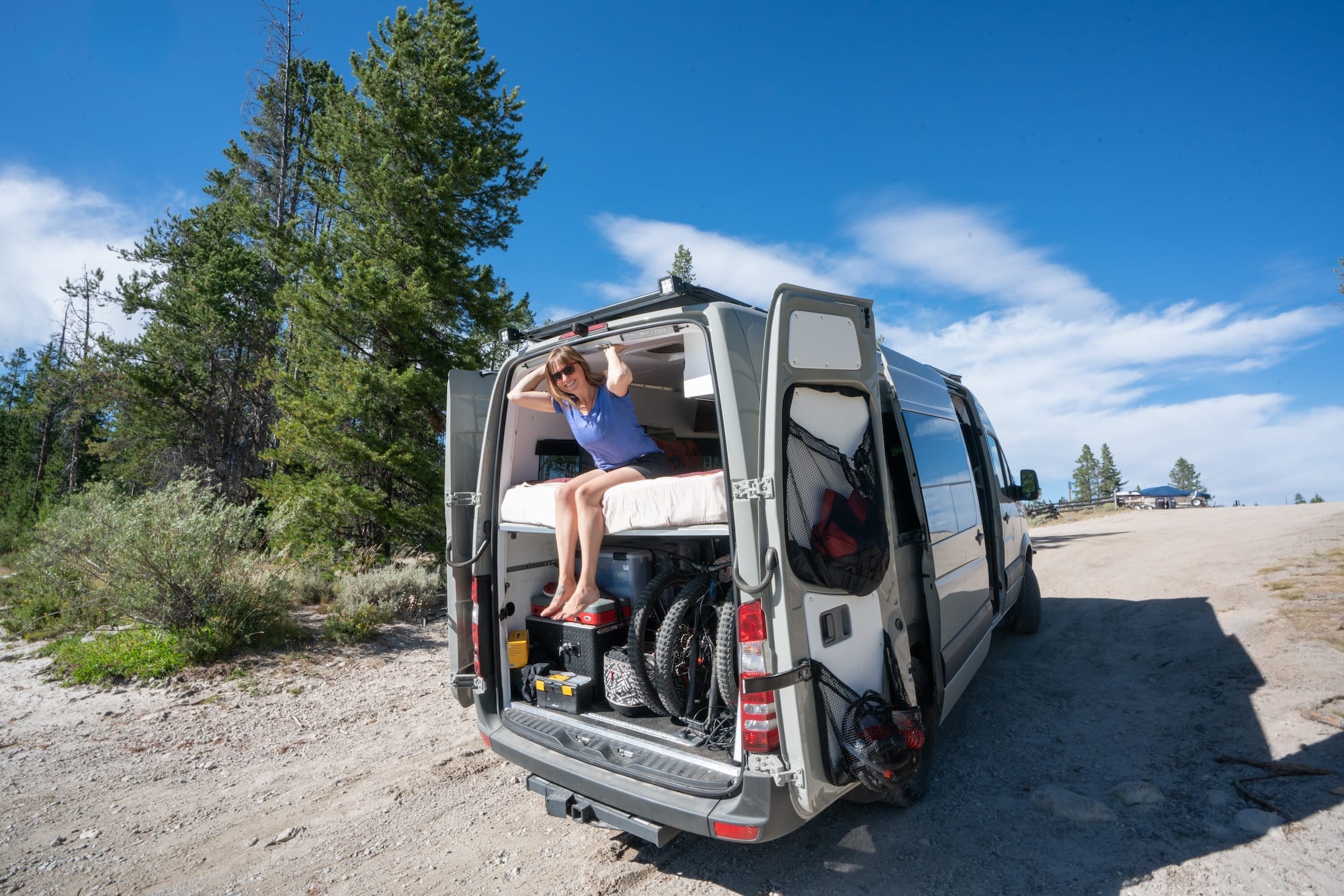
Getting insurance for your campervan isn’t one of the most exciting parts of van life, but it’s an essential one.
Imagine spending all that time and money on your van conversion and then getting in an accident and finding out that the build isn’t actually covered – you certainly don’t want that to happen. So in this blog post, we talk all about RV insurance for campervans and van conversions to give you the information you need to make sure that doesn’t happen.
Campervan insurance can be a complex topic because there are many factors that affect your coverage options – such as DIY vs. professional builds – and insurance requirements and policies vary from state to state. Because of this, it’s impossible to give blanket advice on getting your campervan insured.
In this blog post, we’ll focus on the most important van insurance factors that are essential to keeping you and your investment safe and protected, and some recommendations for campervan insurance companies to check out.
1-on-1 Van Life Coaching
Ready to get over your analysis paralysis and put your van life dreams into action? Let’s make it happen together. Book a 1-on-1 van life coaching call now and take the first step towards a life of adventure, freedom, and unforgettable experiences.
Types of Campervan Insurance
First, it’s important to note the difference between an auto insurance policy and an RV insurance policy. Each state has different requirements for how you can classify your camper van, but generally, these are the options:
Auto Insurance Policy
A standard auto insurance policy only covers the vehicle itself, not any type of build inside or any of your personal belongings. If you were to insure your van with a standard auto insurance policy, just like your regular car, the van would be protected in the event of an accident, theft, or damage depending on the specifics of your auto insurance plan. Again, this does not include coverage of any type of build or conversion inside or any personal effects inside.
RV Insurance Policy (Class B)
If you want the build and the stuff inside your campervan to be insured, you’ll need to get a Class B RV insurance policy. If you didn’t put much money or time into your van conversion, then maybe this isn’t a big deal and you’re ok insuring it with regular auto insurance. But if your van has a lot of blood, sweat, tears, and money put into it, I suggest going with an RV insurance policy so you’re protected in all events, including if the van is totaled or broken into.
I have a Progressive RV insurance policy. I’ve been with Progressive for over 5 years now and used them to insure both my first Sprinter van, second Sprinter van, and my current Sprinter van. They are one of the few major insurance companies that I’ve found that offer coverage for converted vans. However, Progressive only insures professionally converted campervans, they do not insure DIY van conversions.
>> Read my full review of Progressive RV Insurance for Campervans
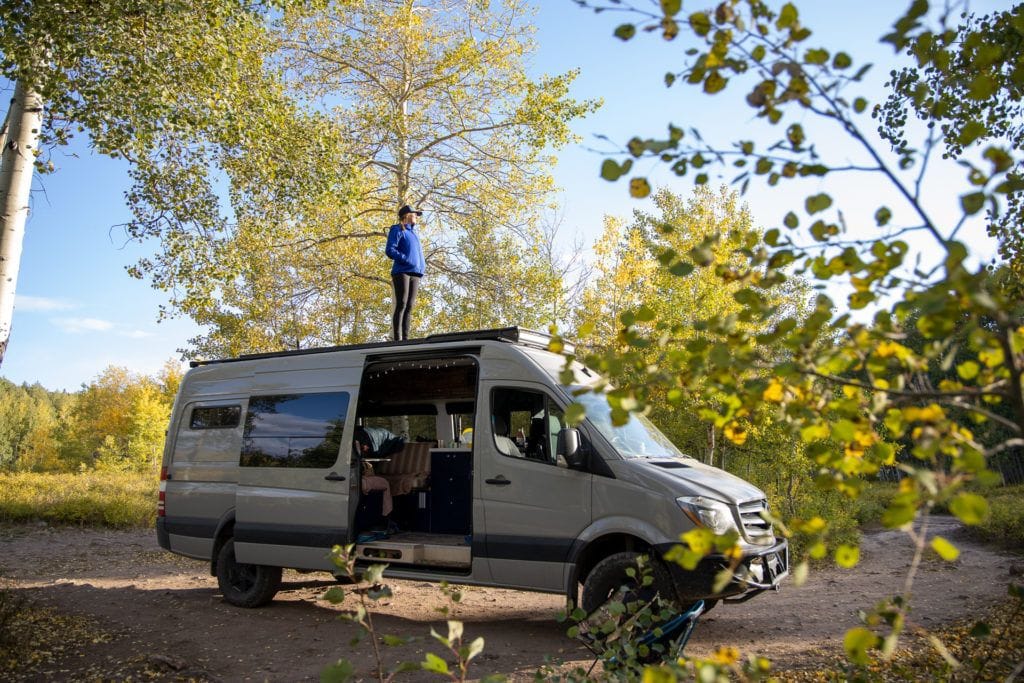
Campervan Insurance FAQs
Can You Insure Your Van as a Campervan?
Different insurance companies and states have different requirements and definitions around what makes a van a campervan. If you have sleeping and cooking bathroom facilities in your van – sometimes this can be as basic as a mattress and a camp stove – some companies consider that van being used as a campervan.
Other companies require the van to have running water, power, and even a toilet in some cases to be considered a campervan. Check the definitions that the insurance company you’re getting a quote from uses to define what a campervan is and what can be insured as a Class B motorhome. These requirements can vary by state as well.
Should You Retitle Your Van as an RV?
Some campervan owners do retitle their van as an RV once it’s converted into a campervan. Progressive, who I have my Sprinter van insured with, does not require a converted van to be retitled as an RV, so I haven’t personally gone through that process.
Some people say that retitling your van as an RV can help lower premiums but I’d recommend checking with the specific insurance company you’re looking to do business with to find out more about this before jumping through those hoops.
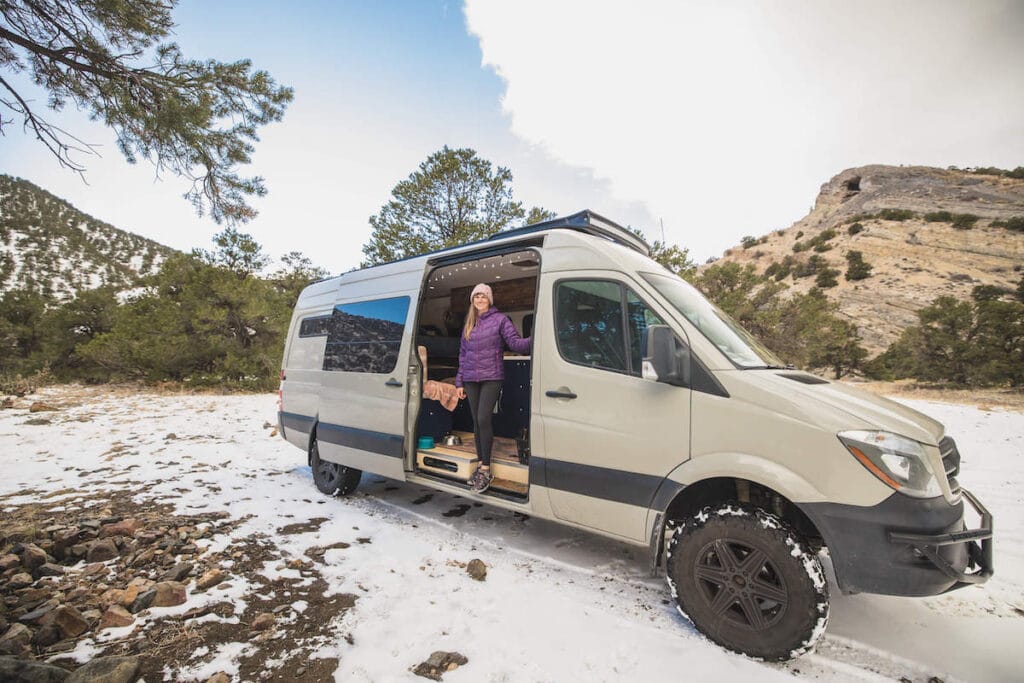
How To Insure Your Campervan Conversion
One thing to mention is that insuring a standard RV or turnkey converted van with a set layout is generally much easier than a DIY build or upfitter build.
For example, companies like Outside Van and Storyteller Overland build turnkey, adventure-ready campervan models with a set layout that has been proven and tested to meet safety requirements, best practices, and industry standards. This, and the fact that their vehicle designs and overall value are well documented, makes it easy for insurance companies to assess and insure their full value. Turnkey RVs and campervans like this are the easiest to insure with RV insurance.
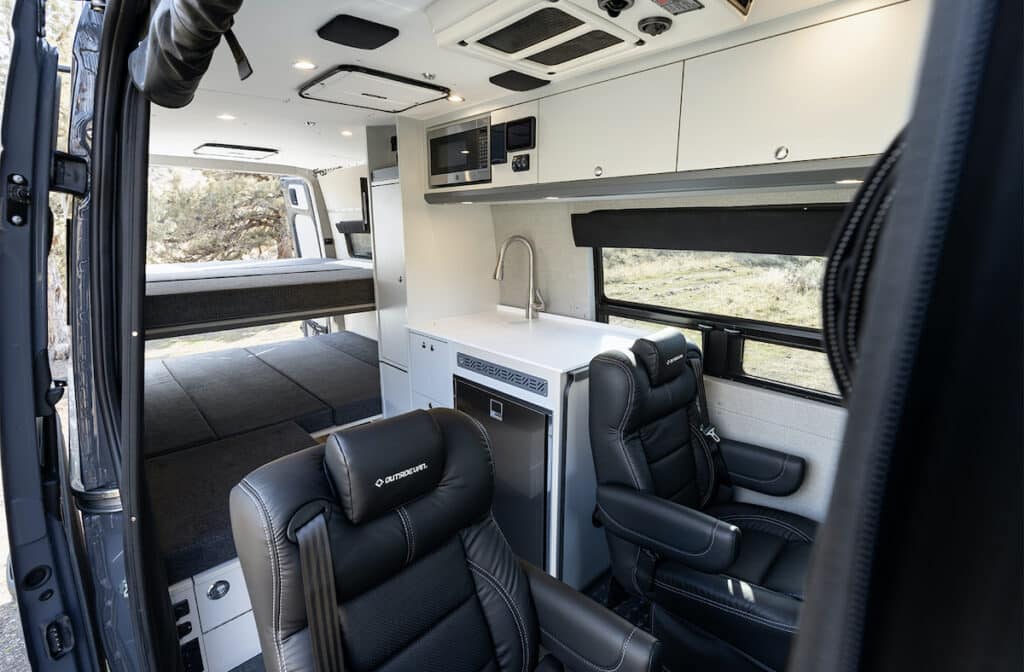
A professionally converted van whether customized (like mine) or using a standard layout can be insurable with RV insurance through certain companies as well. Be sure to save your invoices, receipts, and/or billing statements from your professional camper van conversion as well as the proof of purchase that shows the total purchase price so you have as much straightforward documentation as possible that shows the value of your campervan.
No matter what, be honest and upfront with your insurance company about your van builder to ensure you’re not left without coverage if something happens to your van.
Insuring a DIY Campervan Conversion
Insuring a DIY van conversion with RV insurance so the build is covered is very tricky, but doable — it just takes more effort along with carefully documenting what goes into your conversion.
One of the reasons that DIY campervan conversions are difficult to insure is that it can be difficult to put a value on the overall build and the time you put into it. There’s also no guarantee of the quality of the work or that it follows proper weight and safety regulations, so that’s another reason insurance companies may be more hesitant.
We’ve heard horror stories about van lifers getting dropped by their insurance companies because of DIY builds, so it’s extremely important for you to do your research and be totally honest with your insurance company upfront about your van.
Roamly
There’s a new campervan insurance company on the market that has quickly been gaining popularity with van lifers – Roamly. Unlike traditional insurance companies, Roamly caters to van lifers/RVers and they know how to tailor insurance policies to fit travelers’ needs. Coverage varies based on whether your build is DIY or professionally built and whether you live part or full-time in your van.
Roamly also offers policies that allow you to easily rent out your camper van on sites like Outdoorsy, which is not easy with traditional insurance companies. Not only that, but Roamly customers save an average of 25% on their insurance policies compared to other companies.
Note: Readers have reported as of November 2023, that Roamly is no longer providing insurance policies for DIY camper vans that are lived in full-time.
>> Get a free insurance quote from Roamly here
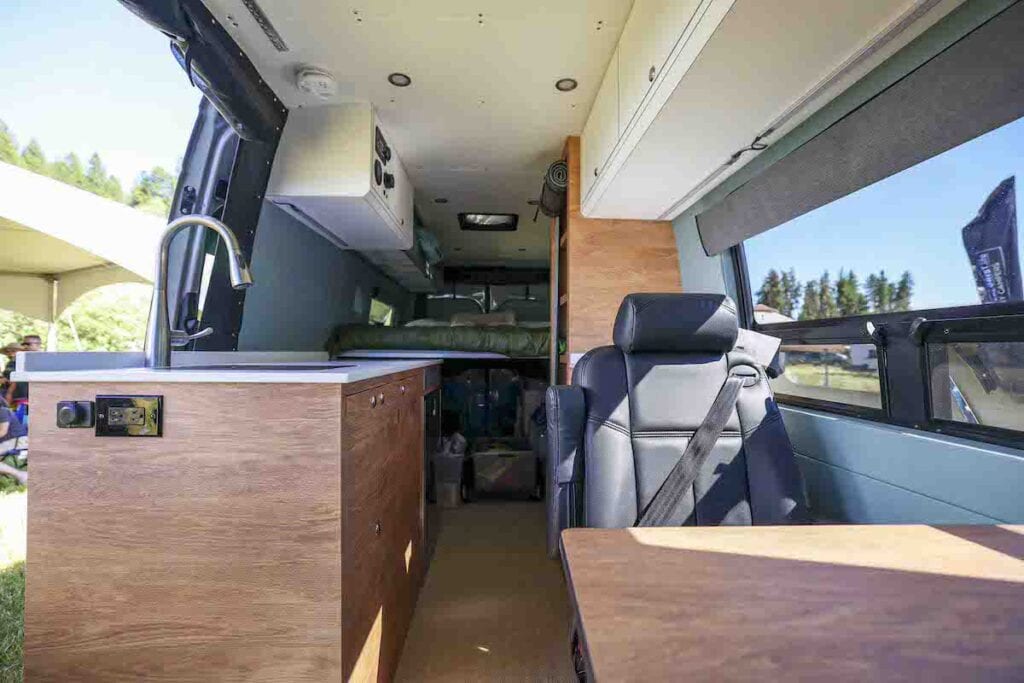
What You’ll Need to Get RV Insurance for Your Campervan
In order to be adequately covered in case of a claim, insurance companies want to see a paper trail. Otherwise, they’ll have no idea how to assess the value of the hard work and material costs that went into your conversion.
Here’s what you’ll need to get insurance for your campervan:
Receipts and Invoices
Keep all your receipts and invoices throughout your build process and make sure to track the labor hours you put into the van if you’re doing a DIY conversion. An Excel spreadsheet is an easy way to keep track of all of your van build expenses.
Photos
Having detailed photos of the van, inside and out, including photos of the valuables inside that you travel with is helpful in case something happens and you need to file a claim. I also recommend making a spreadsheet of the valuables you travel with and the price you purchased them for.
Keep all of this data stored safely online in case you ever need it for a claim. I have a Google Drive folder where I keep photos of my van (inside and outside), photos of my valuables, and receipts for my van and valuables so I have everything ready in case I have to make a claim. I keep this online instead of on my computer in case my computer were to break or get stolen.
Additional Information
RV coverage requirements vary state by state so you’ll need to check with the state your van is registered in. The insurance company you’re getting a quote from may need certain information from you, like VIN numbers, emission testing, a statement explaining the conversion, the van’s gross weight, and more.
Some states have specific requirements that need to be met in order to consider a van an RV or motorhome like running water, a bed, or an electric refrigerator. Look into these ahead of time especially if you plan on having a very simple build.
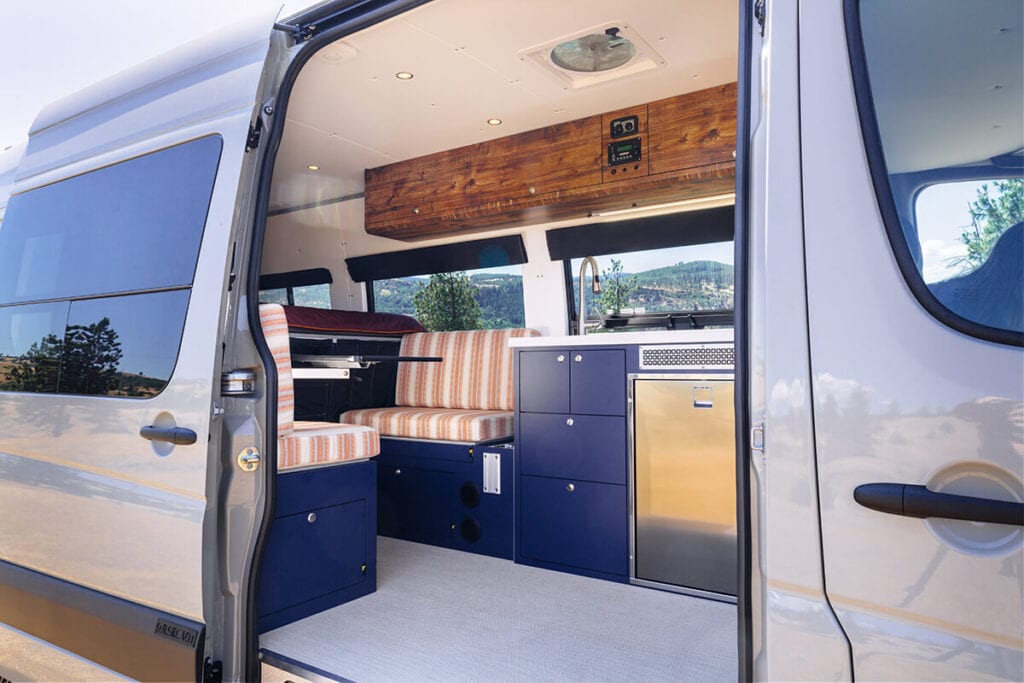
Tips For Choosing A Campervan Insurance Policy
Unfortunately, a lot of people report difficulties in getting their self-built campervans insured for a reasonable cost. Some have had success, but many have not. It’s dependent not only on the company and state but also on circumstances. Some travelers have had luck when they’ve explained their situation in person to an agent after being declined by the same company online or on the phone.
Insuring campervans, whether professionally converted or not, is still a newer concept for many insurance companies. It seems like they’re still working out the processes and exactly what they’re able to cover on their end, so this process requires a little patience.
Here are some helpful tips to help you prepare for your campervan insurance search:
Define Whether You Are “Full-time” or “Part-time”
Different policies define “full-time” differently, so check and see if you are considered full-time or part-time with the company you are considering. With Progressive, for example, full-time is defined as using your RV as your full-time, permanent residence, or if you live in it more than 6 months out of the year.
I travel in my van about 6 months out of the year and am home in Salt Lake City or traveling elsewhere the rest of the time, so the RV insurance policy I have is for part-time.
Full-time RV insurance is more comprehensive compared to a part-time policy and can cover liabilities, injuries, and certain losses that occur around your campervan or RV. However, some companies won’t insure your campervan if they know you live in it full-time and it’s your primary vehicle. This is dependent on the company and the policy so you may have to shop around a bit if you’re a full-timer. I do know that Progressive does offer full-time RV insurance as an option but I don’t currently have any personal experience with this.
Choose Fair Market or Full Replacement Value
If you have the opportunity to choose between fair market value or full replacement value, I personally recommend full replacement value. It will make a huge difference in your policy cost.
The fair market value determined by your insurance company is based on the number of miles on your van and might not equate to the real fair market value based on how well some of these vans actually hold their value.
Explore Coverage Options
You’ll want to review all the different coverage options that the RV insurance company offers. In most cases, Liability insurance is the bare minimum you’re required to have in order to register and drive a car in the U.S., but you’re going to want additional coverage to protect yourself and your vehicle as well.
In addition to Liability, you’ll likely want Comprehensive & Collision coverage, Roadside Assistance, and Total Loss Replacement at a minimum. You can read about the RV insurance coverage options I went with for my van here.
Decide About Personal Effects Coverage
Another thing to think about is whether you want Personal Effects coverage on your RV insurance policy. If this isn’t an option offered by your RV insurance provider, I suggest looking into personal property insurance policies.
Getting personal effects coverage is usually an easy process that requires submitting photos or receipts of your valuables to your insurance company before you take off. An annual policy is usually pretty affordable. Different coverage levels are generally available so tally up the cost of the valuables you travel with to decide how much coverage you might need.
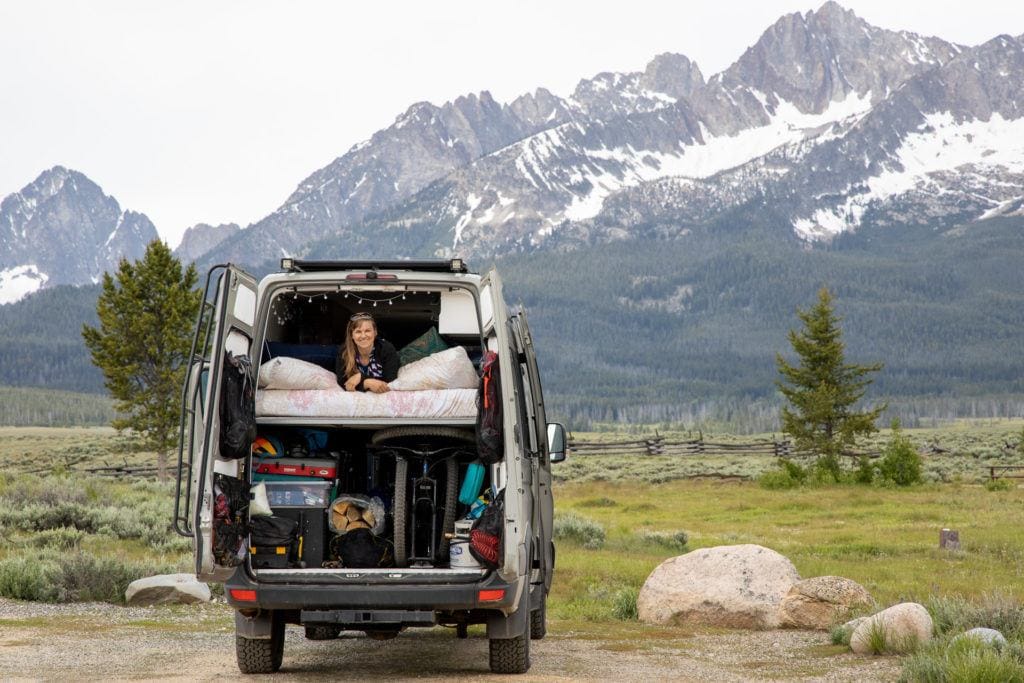
Consider Whether You’ll Be Doing International Travel
If you plan to travel internationally you might need a separate travel or country-specific insurance policy. Inquire about this possibility with your agent and explore all your options.
I do know that if you have Comprehensive & Collision coverage with Progressive, physical damage protection while traveling in Mexico is included as long as you also purchase a Mexico liability policy from a Mexican car insurance company for your trip. This could come in handy if you plan on traveling in Baja California or any other part of Mexico with your campervan.
Shop Around
I encourage you to shop around and get quotes from different companies to see what they can do for you. Ideally, you want a comprehensive plan that will insure the people, belongings, build, and vehicle for a fair price.
We also recommend checking out Roamly, a new insurance company that caters specifically to van life/RVers and can provide a free online quote for your campervan in less than 60 seconds.
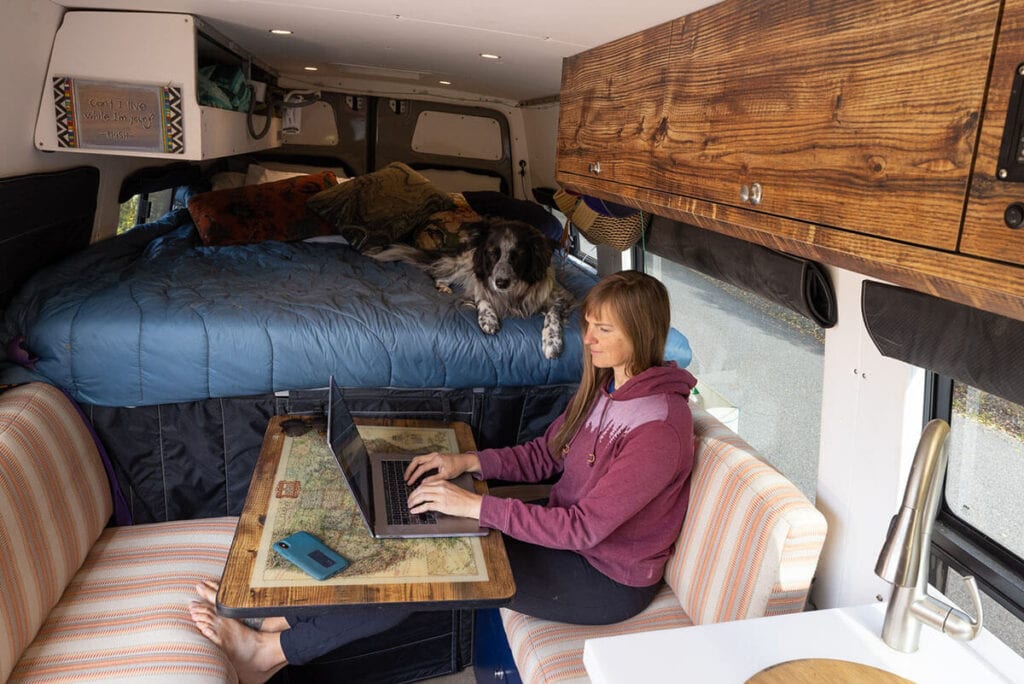
Are you shopping for RV insurance for your campervan? Have you had trouble obtaining it? Share your questions, tips, and experiences down in the comments, and make sure to sign up for our van life newsletter here.
READ NEXT
Get more van life tips in these blog posts:

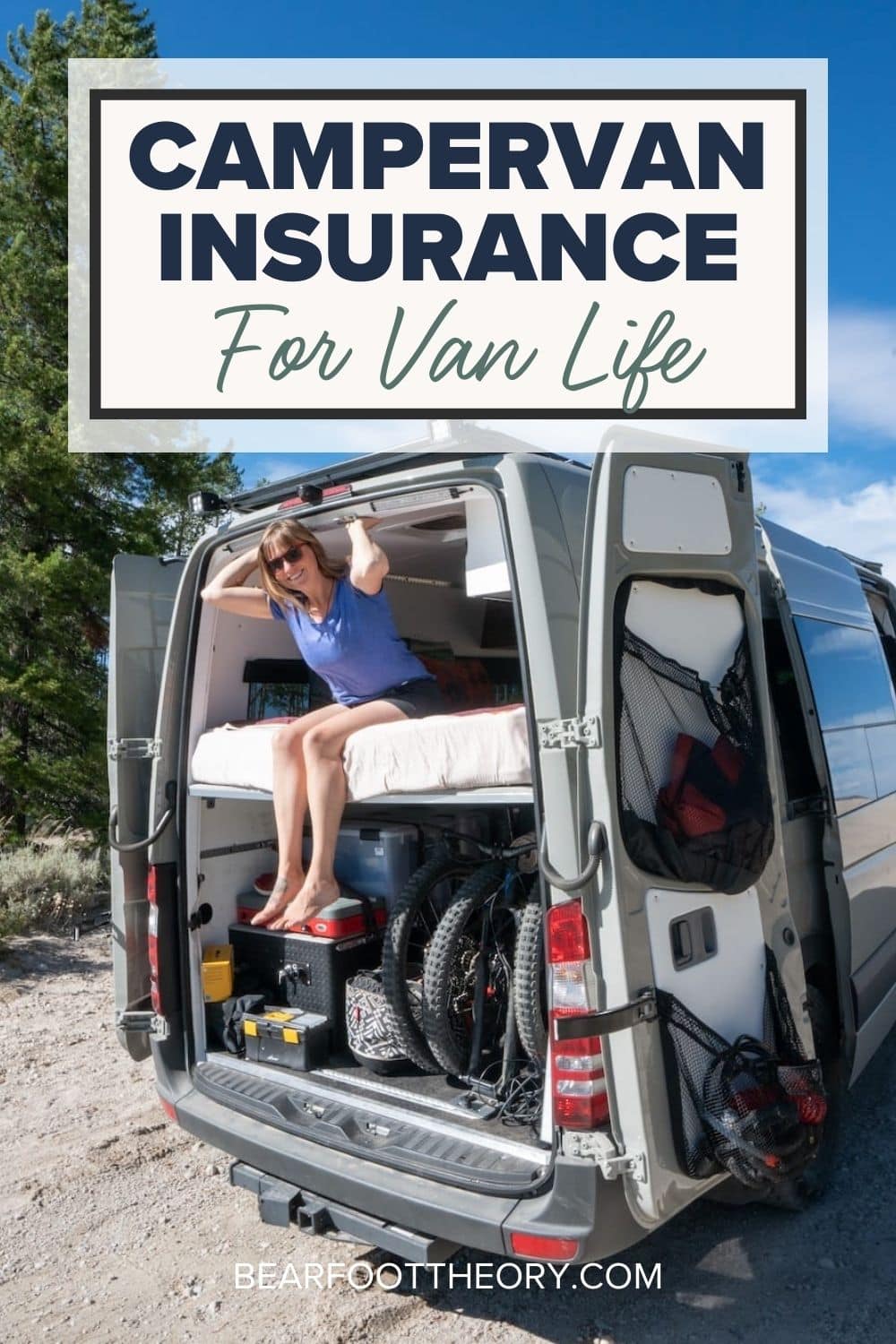
I had a professional van builder do my van build and I’m in the process of having the California DMV reclassify my Sprinter cargo van into an automobile motorhome. You just need to go in and have the vehicle inspected and bring the title and receipts with you. The form you fill out and bring with you is called a REG 256A: https://www.dmv.ca.gov/portal/handbook/vehicle-industry-registration-procedures-manual-2/new-vehicles-sold-by-california-dealers/recreational-vehicles/
Then the DMV changes the classification and your commercial cargo van is a motorhome and when insurance runs the VIN, they can insure it as such. You will also need to show them receipts and photos so they insure the full build. Keep in mind the DMV raises the value of your vehicle based on your receipts so your registration fees will increase as well. I hope this info helps some people with CA rules.
Hi, I work for Country Financial (OR CA ID AZ) and work with clients to insure their new purchase. Being from Bend, OR we see a lot of these and I own one myself. Happy to help with any questions. Anne.jackson@countryfinancial.com
Does anyone know an agent that sells this kind of insurance for montana? We are coming up empty-handed, with independent agents saying that they have tried and have not been able to insure clients who have built their own. Cam anybody help by sending the name of an agent we could work with?
Do you know any resources for finding personal property insurance that isn’t homeowners/renters insurance? When I google “personal property insurance” that’s all that comes up, but obviously neither of those are applicable…
Loved your blog … awesome job ! … I just bought a 99 mini bus with a v10 motor … getting nothing but no’s for insurance it hasn’t been converted yet which i intended to do myself … do you suggest i go to an RV dealership to ensure the bus or go to DNV and have the bes classified as an RV … the make of my bus is an STPU … can i get it changed? …any response would be greatly appreciated … thank you!
Your blog is very helpful and inspiring.
You mentioned Progressive RV as an insurer of converted vans. Today (9/23/2021), Progressive RV straight up told me that they could only insure my van as an RV if it was originally sold as an RV (i.e. not a van converted to accommodate camping/living in it). My van is a RAM Promaster 2500, and its previous owner bought it as a used cargo van and added insulation, flooring, lights, and paneling so it didn’t qualify.
Thanks for letting us know about that, Leslie!
We had the same experience with Progressive trying to get our Outside Van insured, and we would up with State Farm.
Hi Will. Did State Farm write the policy as a six month or as an annual policy? Did you have an endorsement for the customization?
Hi, Leslie, I just read the blog and your response. Which company did you end up going with in the end? thanks, Antony
Love your blog and website. Tons of great information.
We just got our 2019 highroof sprinter back from a professional installer and we are having trouble insuring it. Called a ton of companies and the only two I have had any luck with is State Farm and Progressive: but in the end neither of these worked.
Progressive will only insure it as an RV “Recreational Vehicle” meaning only used during or for recreation. It’s my daily driver and casual camper for my family. I have other cars for daily driving as well but because I’m not a Full Time RV’er and that I can and do drive it to work at times they “will not” insure it.
State Farm was promising but the under writing came back at $300/month for “agreed value”.
We use it for recreational use and to and from work for my wife and I, and because of this I can’t find someone to write a policy on it. So frustrating.
Tried writing a policy as a regular van and then trying to find a supplemental policy just for the extra buildout cost…nope
Stuck. Ideas? Thanks
Hi Tom, congrats on getting the van! Insurance is definitely a huge headache and big hurdle. I’ve used Progressive on both of my vans for the last 5 years & had a great experience (albeit I’ve never had to file a claim), but unfortunately I don’t have much other insurance advice experience since my van isn’t a daily driver. I would recommend looking at local agents to see if anyone can help. Good luck!!
HI all, I recently finished converting my 2019 Sprinter 2500 high top to a camper. I first changed the registration (North Carolina) to a “Auto House” (NC’s terminology for an RV). The registration change was relatively easy; make an appointment, get an inspection and go pay the bill. A bit of red tape but nothing too onerous given you’re dealing with a bureaucracy. I then went back to my insurance company (USAA) to change it over to an RV policy. I had talked with them before getting the original insurance for the Van about doing the change and was assured they could handle the changeover. I did run into a bit of a problem in changing the insurance over to an RV but, after a few phone calls, was able to work things out. My first bit of advise is don’t drop your normal insurance until you’re sure you can get the RV insurance. NC fined me due to a lapse in liability insurance, which USAA has since taken care of but I’ve yet to get back my fine from the state. I must say USAA is the very best insurance company I’ve ever worked with (and I’m almost 70). If you’re a Vet or a Vet’s child I cannot recommend them more. Hope this Helps.
Hi Duane, congrats on your van conversion! We appreciate you sharing your experience insuring your van – thank you!
Hello, my regular auto insurance is with usaa and I insured our promaster 2500 van with them when we bought it in January 2022 but they said they don’t insure any rvs. Any tips on dealing with them for coverage on our converted van would be most helpful!
I’ve only dealt with Progressive insurance so I can’t speak to USAA. Van insurance is definitely tricky with different requirements and classifications for vans in each state. You can read my experience with Progressive here: https://bearfoottheory.com/progressive-rv-insurance/
And my recommendation would be to call local agents for every insurance company in your area to find your best option – calls are better that online quotes since converted vans don’t always fall neatly into a category. Good luck!
We are having our campervan built at the present time. We contacted Progressive Insurance and were told that Progressive DOESN’T INSURE CAMPERVANS!! What a surprise. So, we secured insurance for our van elsewhere.
Hi Jim, are you able to disclose which company you went with? Thanks
I’ve also run into some issues trying to use Progressive to insure the new van I’m having built. The problem that I’ve found is that most vans come off the lot titled as either Passenger or Commercial vehicles which is fine when initially insuring them with auto insurance. However, once you’ve had a company convert it into a campervan, insurance companies (including Progressive) won’t insure it as an RV UNLESS you have it retitled as an RV through your local DMV. They also won’t allow you to insure it with regular auto insurance just for the van itself because it’s been modified.
This can also be a problem for those who have financed their vehicle (not the build) since most lienholders won’t allow a vehicle to be retitled (check with your financier to understand this before proceeding). I personally have had to work with several banks to find a solution that would allow me to finance the vehicle purchase AND retitle the van as an RV at a later date in order to keep it legally insured. Let’s just say this was a headache I wasn’t fully prepared for and don’t want others to experience without at least knowing it’s coming.
Hello, Thank you for centralizing all this great information on your blog. I am in process of purchasing a van and hitting lots of challenges for insuring. I want to be full-time in a built out Sprinter or Transit. Since I will be living in it and traveling both domestically and internationally (potentially shipping too), and running my business out of it, do you have any recommendations? What do you do as it relates to your business? Are you able to insure and classify it as “home business”? It seems many who live or travel at least 6 months do this and also wondering about how to approach this with IRS. Thanks! – Kevin
Hi Kevin, Congrats on getting the wheels turning on van life! Insurance is definitely one of the biggest headaches – if your van will be professionally converted, I highly recommend Progressive (the company I’ve used for both of my Sprinters) – I have a detailed review here: https://bearfoottheory.com/progressive-rv-insurance/. Unfortunately, they do not insure DIY builds. Since I am only part-time in my van & have a home in Utah, I do not insure it as a “home business”. Calling local agents is another tip for getting insured – they’re more likely to be able to help you since van conversions can be so nuanced and specific to the person/van.
As an insurance agent that has worked with many clients that own converted vans across the country we’ve learned that Foremost is a great solution for those looking to insure their campervan if it was upfit by a professional van conversion company. We’re always happy to assist campervan owners find a quality solution. Here’s a link if you are interested in getting a quote or need help in securing a policy https://www.schneidermaninsurance.com/custom-rv.html.
Thank you for this link! We bought a Ford Transit January 2022. We live in California. We had it converted by a professional company in Reno, NV. Our USAA policy would not insure it for its conversion value (although they were not going to drop us for converting it, but they would only insure it for an additional $5000 in upgrades). USAA referred us to Progressive, who would not insure it as an. RV unless done by a mainstream company (Winnebago, etc). I made many phone calls and struck out. I ended up reading this blog and called Schneiderman insurance. I got a very competitive quote for the full value of the vehicle plus the full conversion costs through Foremost. The only other company that would even provide a quote was State Farm (local agent), and that was for 5x (!) the Foremost quote. I did not have to provide any receipts for the conversion or any photos. I did have to match my coverage on the van with our other (2) vehicles insured with USAA and had to provide proof of those limits on the other vehicles. USAA said they will even keep the van on our umbrella policy, as long as certain limits are met, even though the van is no longer primarily insured by them. We did not have to change the title of our van from commercial to VC (Van Camper) with the DMV, although it is now insured as a Class B camper van. Of note, the van will not be our daily driver and we will not be living in it full time. I am so relieved to have found this company since we’ll be ready to drive the converted van out the door next week. I hope this is helpful to some. Kudos to Gabby who was very responsive and patient with us during this process.
Hi Lisa, I’m in Reno and looking for a van conversion company. Which one did you use? Thanks, Kris
I am buying a RAM Promaster 2500 from a professional van conversion LLC. It has a side window with a slide that I believe was added, otherwise there are no windows behind a cab area. Progressive would not (3/9/22) insure a van that was originally sold as a commercial van… as evidenced by lack of windows.
Hi Liz, getting your van insured can be a painstaking process. We recommend calling around to all companies to see which is best – it can also vary state by state, unfortunately. I’ve used Progressive for both of my Sprinter vans but haven’t run into any issues. Best of luck!
Geico wont insure mine Sprinter Conversion. At first they said they would under an umbrella policy, but once completed they said no and to contact an insurance broker, but most of them are hesitant if not converted by a company.
Hi Allen, unfortunately it can tricky to insure a van, especially one not converted by a professional company. However we do know many people who have found agents to work with them – it varies by state and we recommend just calling around to see what works best. Insurance can be a headache in the van conversion process for sure, best of luck!
This article on insurance is SO helpful in figuring out the best options for a camper van! It’s amazingly hard to get answers from insurance companies about getting the right coverage for my needs. You’d think it’d be easier now that van life is such a popular thing.
Hi Jackie, glad you found this helpful! It definitely can feel like jumping through hoops at times, but hopefully it is getting easier with more and more vans on the road.
What I would like to know is how Insurance Companies determine how to pay out a loss once a loss has occurred. In my case I purchased a van from a builder and because of the quality of the build I have been able to obtain quotes from Progressive and State Farm even though the builder wasn’t licensed and am working on getting a quote from Foremost. Those are the insurance carriers I have been told carry insurance on our kind of builds. My van is a 2016 Sprinter 2500 extended length high top and the build was completed in 2021. The insurance companies are accepting a value of $90,000 based on my purchase cost and the RV Trader listing I provided and the vehicle report however they won’t give me a copy of the policy before I purchase it. Strange. I just went through a two year fight with USAA over a homeowners water claim, after forty years with the Company, in which I now understand the divisive ways insurance company’s set up the environment to insure they don’t have to pay out based on unwritten payout procedures. Just because we are able to get a policy written on a diy doesn’t mean we have succeeded if an incident occurs and our insurance companies don’t pay out according to our understanding or the insurance companies failure to disclose all policy provisions which they refuse to clarify or identify when we purchase the policies. I think this is a important discussion for all of us owning diy after market conversions. The purchase of our van is a significant investment for most of us. I am not so concerned about accidents as I am of theft. Can anyone add their own experiences?
I just did a side by side comparison of Roamly v Progressive. Roamly was about $15 less per month than Progressive w all the same coverages. I live in California and was able to select class B camper van coverage for both.
Hi Vaughn, thanks for sharing your experience!
Today, 3/28/23, I was in a call with Roamly and they’ve stopped covering DIY Camper Vans for new registration at least ! 🙁
Hi Maria, thanks for bringing this to our attention! We’ve updated our blog post.
I called Roamly and they do NOT cover DIY vans and they do NOT cover full-timers.
Hi – thanks for bringing this to our attention! We’ve updated our blog post.
Full timers insured PRIOR to March 1st 2023 are still covered, they are just not insuring new full timer’s.
Thanks for the clarification!
Yep, I had a Roamly Policy from Nov 9th 2022 to now, and just found out they no longer will be insuring diy or full timers and my policy will be ending on the 9th this month, so back on the hunt for new insurance now 🙁
Thanks for the update. I went ahead and added a note to the post about Roamly. Appreciate the insight and hopefully you can find a good policy to replace it. Unfortunately, it seems like it’s getting more difficult every year. I’ve also heard good things about State Farm, so maybe that’s one company to check with.
Having just gone through the insurance game looking for better rates there is a gotcha with Roamly I hit that others might not be aware of. I spoke with Roamly and they still do insure DIY vans. They do require a phone call and some information to prove value. We use our DIY van for weekend camping and random adventures and do not live full time in it. Their rates were very good when compared to State Farm. Literally around 1/3 of the quoted State Farm rate before any discounts! Knowledgeable staff and was a great experience talking with them. But… the gotcha and sadly why we couldn’t use them is they max out at 100/300k liability. If this isn’t a problem for you great look no further! For us with having an umbrella liability policy it requires 250/500k liability on our Van and any other vehicles.
So that leaves us back with State Farm, who keeps raising the rates… +31% over one year with no claims or violations! Insurance is rough subject for a DIY Van NOT built by a known commercial builder. If someone says it is easy I’d guess they are insuring incorrectly. Be prepared to work for finding coverage if you do have other insurance requirements like an umbrella policy. State Farm is literally the only insurance company we have found that will insure at a level that will work with other insurance policy requirements. Good luck!
Thanks for sharing your experience, this is all really helpful to know!
Please note that as of March 2023, Roamly can no longer cover DIY builds for full-time campervan-ers. You can be one or the other, if I am understanding their email correctly, but not both. We had our policy through them, and were just notified this past week (October 2023) that we could no longer be covered due to that combination. They referred us to State Farm for a new policy.
Thanks for that update – I have updated the post to let people know. Hope you found a good alternative with State Farm.